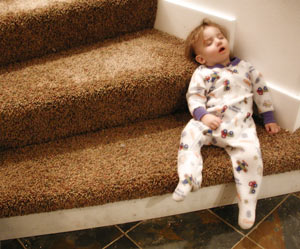Go To Bed!
 If there is one simple thing we can do for our kids to help them out in a number of ways, it is this: Have a consistent bedtime with plenty of sleep.
If there is one simple thing we can do for our kids to help them out in a number of ways, it is this: Have a consistent bedtime with plenty of sleep.
Yes, I know what you are thinking: “Another parenting article making me feel guilty about something I’m doing wrong as a parent.” Trust me, I know how hard it is to set, and enforce, a regular bedtime. I’ve got a 13 year old and 15 year old who often seem to get their second wind around 9pm. But the benefits of a good amount of consistent sleep are compelling.
A recent study published in the medical journal Pediatrics shows a correlation between children having a consistent bedtime and behavior. The more inconsistent the bedtime, the more that kids had behavior difficulties. Although there could have been many factors that also led to behavior problems, it’s pretty clear that consistent bedtimes are helpful.
“OK, Neil. Sounds good, but how do I make it happen?”
The good news for us in Loudoun County is that our school system has the wisdom to reverse the typical time for school opening. Our high school kids go to school up to 1.5 hours later than kids just a few miles away in Fairfax. This makes a huge difference in trying to enforce bedtimes for our teens since they are able to wake up later than most teens in the USA.
Here are some tips that will increase the likelihood that you will be able to get your kids to bed on time:
 For younger kids, make sure to have a bedtime routine. Most kids thrive on routines and will be upset if there is a change in the routine. Routines can include reading together, prayers, taking a minute to share your daily gratitudes, singing a bedtime song, etc. Routines like this become a fun and calming part of their lives, and often become family traditions that they can share with their own kids.
For younger kids, make sure to have a bedtime routine. Most kids thrive on routines and will be upset if there is a change in the routine. Routines can include reading together, prayers, taking a minute to share your daily gratitudes, singing a bedtime song, etc. Routines like this become a fun and calming part of their lives, and often become family traditions that they can share with their own kids.
For older kids, rewards often work much better than punishments. Since getting to bed is what I call a “Start Behavior,” using rewards tends to increase motivation for a goal. The rewards don’t have to be big in order to create change. If you have a child that is having trouble getting to be on time, try this: “If you are in bed with the lights out and all technology off by 9:00, you earn an extra 30 minutes tomorrow on (the x-box, computer, playing with friends, playing cards with the family, etc.).”
If this doesn’t work after about a week of trying, you might want to increase the intensity a bit. The best way to do this is to make your kids earn what they used to get for free. For instance: “Starting tonight, you will need to earn your one hour of video games by getting to bed on time. If you are in bed with the lights out and technology off by 9:00, you have earned your video game time tomorrow.”
Here are some great guidelines from the National Sleep Foundation concerning amount of sleep based on age:
Toddlers (1-3 years)
Toddlers need 12-14 hours of sleep in a 24-hour period. When they reach about 18 months of age their naptimes will decrease to once a day lasting about one to three hours. Naps should not occur too close to bedtime as they may delay sleep at night.
Sleep Tips For Toddlers:
• Maintain a daily sleep schedule and consistent bedtime routine.
• Make the bedroom environment the same every night and throughout the night.
• Encourage use of a security object such as a blanket or stuffed animal.
Preschoolers (3-5 years)
Preschoolers typically sleep 11-13 hours each night and most do not nap after five years of age. As with toddlers, difficulty falling asleep and waking up during the night are common. With further development of imagination, preschoolers commonly experience nighttime fears and nightmares. In addition, sleepwalking and sleep terrors peak during preschool years.
Sleep Tips for Preschoolers
• Maintain a regular and consistent sleep schedule.
• Child should sleep in the same sleeping environment every night, in a room that is cool, quiet and dark – and without a TV.
School-aged Children (5-12 years)
Children 5 to 12 need 10-11 hours of sleep. At the same time, there is an increasing demand on their time from school (e.g., homework), sports and other extracurricular activities. In addition, school-aged children become more interested in TV, computers, the media and Internet as well as caffeine– all of which can lead to difficulty falling asleep, nightmares and disruptions to their sleep. In particular, watching TV close to bedtime has been associated with bedtime resistance, difficulty falling asleep, anxiety around sleep and sleeping fewer hours.
Sleep Tips for School-aged Children
• Teach school-aged children about healthy sleep habits.
• Emphasize need for regular and consistent sleep schedule and bedtime routine.
• Keep TV and computers out of the bedroom.
Neil McNerney is a licensed counselor and author of Homework – A Parent’s Guide To Helping Out Without Freaking Out! and The Don’t Freak Out Guide for Parenting Kids with Asperger’s.